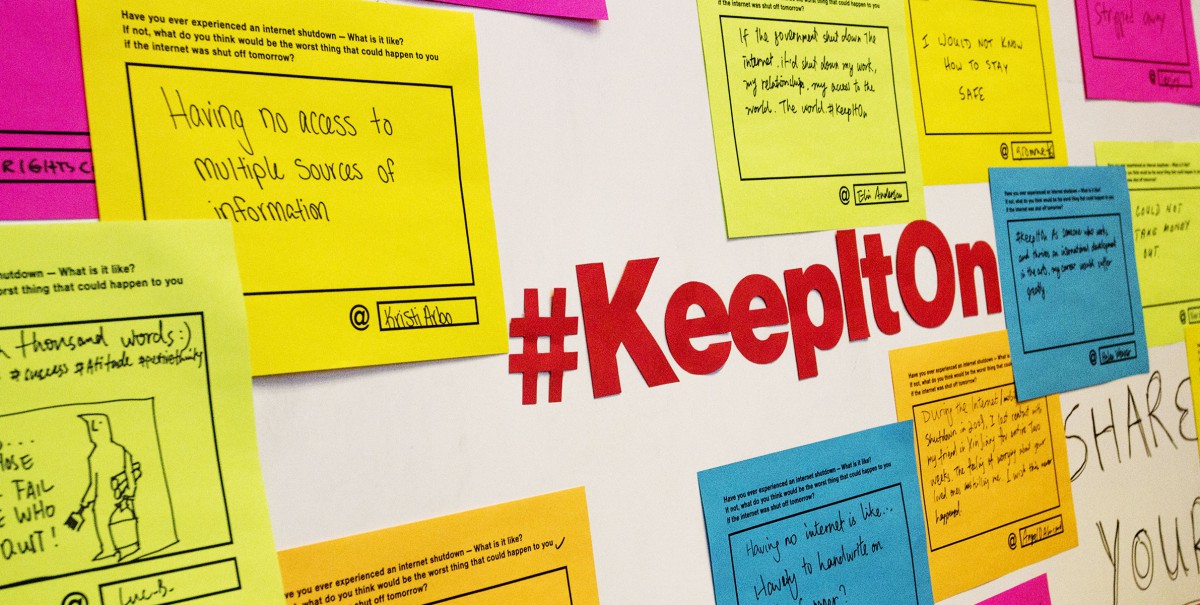At RightsCon, we launched our #KeepitOn campaign to fight internet shutdowns worldwide. We’ve been overwhelmed by the positive response, with people joining us from all around the world. Many of you have shared your thoughts and experiences with internet shutdowns, and have also started to let us know when you hear about a shutdown. Technologists, policy makers, and victims of shutdowns came together at RightsCon to develop a definition of internet shutdowns, creating a baseline for pushing back.
The bad news is that we have recorded at least 15 shutdowns in 2015 that fit this definition, and it looks like that record will be broken in 2016.
What’s happening now
Over the past few weeks, Access Now has recorded shutdowns in Chad, Ethiopia, India, and Pakistan. Each shutdown is unique, but they all harm people, violating human rights and often damaging the local economy. In Chad, the government blocked internet services for at least 48 hours during its presidential election, demonstrating that there is a growing trend of governments shutting off the internet during the most crucial moments in the democratic process (President Idriss Deby has been in office since 1990, after taking power in a military coup). In the region of Oromia in Ethiopia, the government blocked key internet services including Twitter and WhatsApp for more than a month. There, protests flared after more than 200 demonstrators were killed.
People in India and Pakistan have also unfortunately become frequent victims of shutdowns, which are not only regularly imposed, but sometimes scheduled well in advance — despite the fact that they violate freedom of expression and disrupt local businesses. India has blocked mobile internet in both Gujarat and Kashmir.
In Kashmir, the owner of a juice stand told the Kashmir Reader, “My sales have subsequently gone down by 30 to 40% from the last few days as most of my orders would come via Whatsapp, emails, and Facebook from here as well as from other districts of the valley. So, very few orders have come because of no internet connectivity.”
In Pakistan, the government has carried out shutdowns for a broad array of purposes and rationales, such as for religious holidays or to ostensibly provide security when public officials are moving through the country. These instances are being tracked by our partner Bytes for All on its Killswitch Timeline.
Regardless of the rationale, these shutdowns violate our rights and must be stopped. They cut off access to information, damage the economy, prevent journalists from reporting the truth, block emergency services, and can be used to obscure other human rights violations. And when governments order these shutdowns, telecommunications companies usually comply without pushing back.
What you can do
If you want to help us continue to fight these shutdowns, we encourage you to visit our newly updated resource page. There, we’ve uploaded a new Visuals kit with #KeepItOn graphics that you can freely use and remix for your own local campaign. (For inspiration, check out this great t-shirt created by the Sinar Project in Malaysia!)
As for Access Now, we’ll continue tracking and drawing attention to internet shutdowns, wherever they occur. We will also be making a strong push to stop them at the United Nations and in other key venues around the world. And we’ll be reaching out to companies to provide guidance for responding to government requests for shutdowns. Stay tuned by following us on Twitter or Facebook, and join the discussion using the hashtag: #KeepitOn
